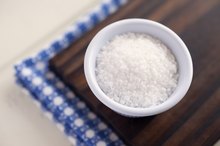Allergies to Salt
The term allergy is not a true scientific word, according to Dr. Leo Galland, director of the Foundation for Integrated Medicine in New York. Galland explains that allergy means "altered reactivity." However, an intolerance to something is generally referred to as allergies or an allergic reaction 1. The list of possible allergens can be almost endless. Because some people have a reaction to eating salty foods, they consider salt an allergen.
Misconceptions
Typical salt, referred to as table salt, is sodium chloride. Salt, in the form of sodium, is necessary for the body's survival. If people are having allergic symptoms such as a swollen tongue or lips when eating something salty, it is most likely a reaction to the chloride. Because there are many different salts such as sea salt, a person may have a reaction to other ingredients. Narrowing down the specific salt causing the reaction will alleviate the condition, yet still allow the body to receive necessary salt.
- Typical salt, referred to as table salt, is sodium chloride.
- If people are having allergic symptoms such as a swollen tongue or lips when eating something salty, it is most likely a reaction to the chloride.
Salt Deficiency
Antihistamine Diet
Learn More
According to Dr. F. Batmanghelidj in "Your Body's Many Cries for Water," a salt shortage in the body can trigger a histamine reaction. Basically, the body is trying to preserve fluids for vital parts of the body like the brain, lungs and liver. Lack of water or salt can cause an overactive histamine reaction which produces allergy-type reactions 1.
- According to Dr. F. Batmanghelidj in "Your Body's Many Cries for Water," a salt shortage in the body can trigger a histamine reaction.
Increasing Salt
Batmanghelidj says salt is a natural antihistamine. He recommends increasing salt intake to stop an over-production of histamine as long as you don't have high blood pressure. A small amount of salt, a "pinch" between your fingers placed on the tongue after drinking water may be beneficial. The small amount of salt on the tongue signals your brain that a great deal of salt has entered the body. Batmanghelidj states that the brain triggers the bronchioles to relax for breathing problems.
- Batmanghelidj says salt is a natural antihistamine.
- A small amount of salt, a "pinch" between your fingers placed on the tongue after drinking water may be beneficial.
Symptoms
How Does Salt Affect Protein?
Learn More
Symptoms of a reaction to salt or compounds in salt can vary. If the reaction is from touching something salty, the symptoms show like contact dermatitis with itching and red patches. If you ingest salt, the reaction is that of a food allergy, which can include:
- itching
- eczema
- hives
- swelling of the face
- throat
- lips
- tongue
Swelling can also occur in other areas of the body. More intense reactions can include nausea, vomiting, dizziness, diarrhea and fainting. At the extreme of an allergic reaction, food allergies have been known to trigger anaphylaxis 1. This can be life-threatening as the airways are constricted. Shock and loss of consciousness can occur. A reaction to salt is a sign that the immune system is over-reacting. It is important to narrow down what substance in salt is causing the reaction and find an alternative.
- Symptoms of a reaction to salt or compounds in salt can vary.
- If you ingest salt, the reaction is that of a food allergy, which can include: * itching
* eczema
* hives
* swelling of the face
* throat
* lips
* tongue Swelling can also occur in other areas of the body.
Salt Therapy
An emerging treatment called halotherapy is a method to breath microscopic salt particles to alleviate colds, asthma and allergies 1. The treatment is in specially designed salt caves or rooms created from salt. A high volume of salt compounds fill the air for a therapeutic affect.
The Cochrane Database of Systemic Review published a study in 2007 on the benefit of salt treatment. It said saline (salt) may flush "bacteria, viruses and allergic particles out of the nose."
- An emerging treatment called halotherapy is a method to breath microscopic salt particles to alleviate colds, asthma and allergies 1.
Significance
Salt itself is not indicated as an allergen although substances in salt may imply that salt is the problem. Also, lack of salt may be the trigger to histamine activity in the body. If you have a reaction to salt seek alternative types. Consult your health care professional for questions or concerns about increasing salt intake or seeking halotherapy alternative treatments.
- Salt itself is not indicated as an allergen although substances in salt may imply that salt is the problem.
Related Articles
References
Writer Bio
Debbie McRill went from managing a Texas Department of Criminal Justice office to working for Compaq and Hewlett-Packard as a technical writer and project manager in 1997. Debbie has also owned her own businesses and understands both corporate and small business challenges. Her background includes Six Sigma training, and an Information Development career with journalism and creative writing as her passion.









